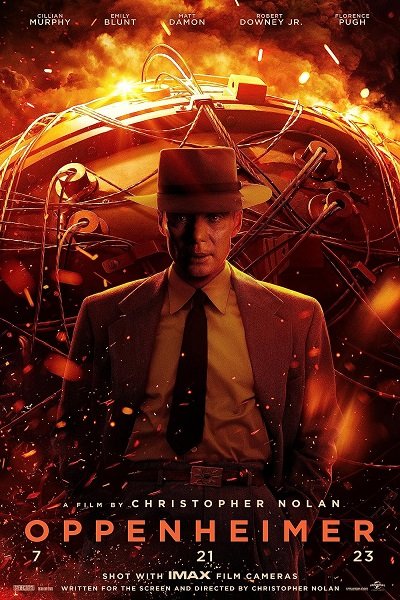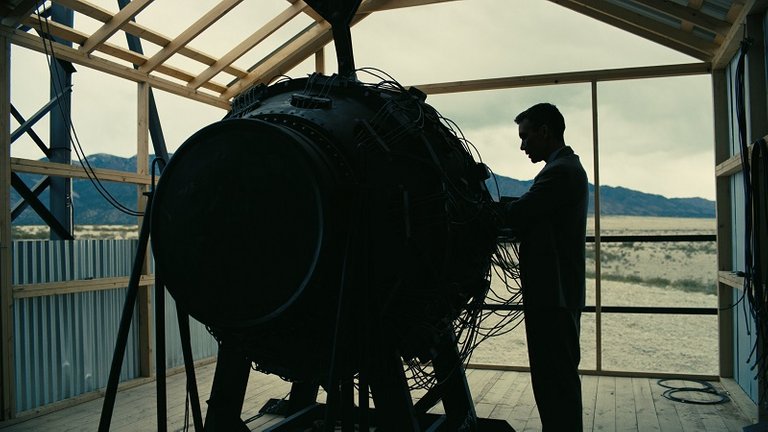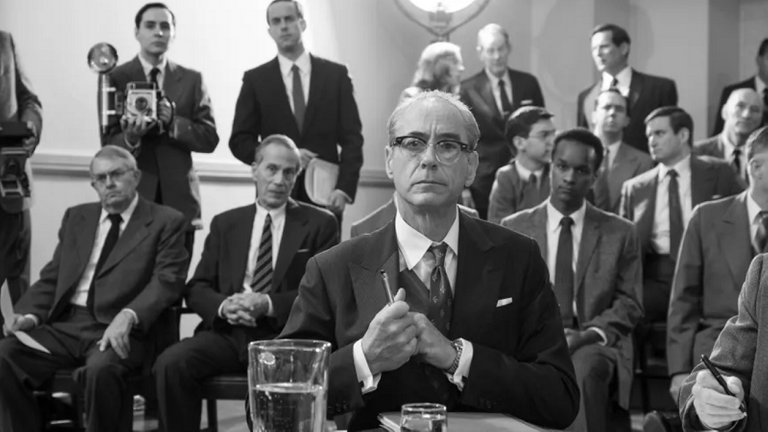MOVIE REVIEW: “Oppenheimer” (2023)

Synopsis: Intense biography of the important, influential and controversial American scientist J. Robert Oppenheimer, considered as the “father” of a revolutionary creation: the atomic bomb.
The nature of autobiographical movies generally works as a kind of “natural magnet”, naturally attracting the audience's attention because they already know that they are going to watch a plot based on real events. Even if many of the facts shown are just a tangle of conjectures or speculations about what really could or could not have happened, the essence of the project's primary idea remains a fundamental piece of marketing. Once people understand that there is a real background to the story being told (especially if the subject in question is extremely relevant), the interest becomes real... And that's exactly what happens here.

Second World War. In the midst of the troubled 40's, a name would be about to change the history of the world. J. Robert Oppenheimer is a brilliant theoretical physicist, with a restless mind and a hunger for more and more knowledge. When he realizes that, with the help of other professionals as brilliant as he is, there is a real chance of creating something unprecedented (and literally bombastic), his world turns upside down. In your hands, the opportunity to create an atomic bomb, and also, to define the new course of world history. Becoming the leader of the Trinity project and head of the Los Alamos laboratory, Oppenheimer begins a dangerous and unprecedented journey.
The screenplay is based on American Prometheus, a biography of J. Robert Oppenheimer written by Kai Bird and Martin J. Sherwin, and builds an intense narrative throughout its almost 180 minutes of projection. In the midst of a timeline that may seem confusing to anyone who is not aware of the events, the facts are shown with alternating colors (black and white or in color) to emphasize what is being shown. Before delving into the events, it is necessary to understand where they are being materialized and this can be a difficult mission for anyone waiting for a “self-descriptive” movie, because this is definitely something that is never the focus of the plot.

The script's approach has a challenging tone. The comings and goings in the story and the countless characters that are part of it are responsible for making this movie dynamic at levels that are often frantic. However, that doesn't always work, because the movie is relatively long for what it actually sets out to do. There are two very obvious paths within the narrative, the scientific side and the political side. On the one hand, there is an incessant search for studies with an almost “humanitarian” touch, based on Science and on the power of what is still chemically hidden. On the other hand, there is also another incessant search, but the focus is directed to Politics (in particular, the US government).
This narrative equation is not so well balanced, and the political side weighs much more than the scientific side. Since the script chose to tell the story in the first person, the movie becomes something intrinsically personal, with many intimate touches, but almost all of them focused on a “dissection” of words that has a single objective: to reveal the complex layers of the protagonist in the midst of legal struggles (be they traditional or not) that are “judging” both the importance and the complexity of his actions (not only on professional levels, but mainly on personal levels). Within this bias, the script is very intense, dramatic, thought-provoking and functional.

In the midst of so many events, the movie manages to direct the audience to everything that is being shown in an almost mesmerizing way. Involving scientific and political aspects of immeasurable magnitudes, there are aspects with a high level of creativity. This is evident, for example, when one of the climaxes of the plot (the explosion of the world's first nuclear bomb) happens in a disconcerting way, capable of causing a consistent reactive effect on people without having to emit any kind of sound. Although this scene is emblematic and powerful, I need to register here that I expected a little more from this end result, because there was potential for the impact to have been even greater.
After this “apocalyptic” event, the script focuses exclusively on the more politicized side of the plot (becoming a little tiring at times, but at other times, delivering a very engaging pace of tension) and presents a lot of dramatic unfolding, thus evidencing the quality of the entire cast. Cillian Murphy delivers one of his best performances and really shines brighter than any other name in the cast. However, it is worth mentioning that names like Emily Blunt, Robert Downey Jr. are also important, and even the poorly explored (but great) Rami Malek and Florence Pugh deserve an honorable mention for their performances.

Narratively, the script does not allow space for the characters (with the exception of Oppenheimer himself) to be very well built. In particular, the female cast is sublimated into relatively simple participations and when compared to the male cast, it is almost an “invisible” part of the plot. In general, they are “thrown” onto the screen at a frantic pace. At times it's easy to get lost in who's who, because their excess even causes a certain mental discomfort. Packed with so many characters (and subplot stretches), the movie has its dull moments. In the end, everything works out extremely well, but until then the script has some "flaws".
Extremely well produced, everything that is seen (and mainly heard) is of a really absurd quality. The most incredible point of the project is, without a doubt, the powerful soundtrack (composed by Ludwig Göransson) and all the sound effects. The experience of watching this movie in theaters is really something surreal. I had the opportunity to watch it from the front row, and in many situations I felt my chair shake in very specific moments of tension and that was incredible. In addition, the practical effects are great, the setting is very convincing, the costumes combined with colors and opaque lights have a very cool effect and the construction of the sets, in addition to being detailed, is very careful.

Oppenheimer was written and directed by Christopher Nolan, and once again what he does is something exquisite. Even if in some moments there is a kind of very alarming “American patriotism” inserted in the plot (something that can be considered as justifiable for the paving of the story), what he did goes far beyond that. The work within a complex narrative was very well directed, embracing the most complex items that were on the table. It would be no exaggeration to say how Nolan knew how to use everything to his advantage (in particular, the play of lights and sounds that has the power to create disturbing scenes), and in this way, created a true cinematic experience.
Sinopsis: Intensa biografía del importante, influyente y controvertido científico estadounidense J. Robert Oppenheimer, considerado como el “padre” de una creación revolucionaria: la bomba atómica.
La naturaleza de las películas autobiográficas generalmente funciona como una especie de “imán natural”, atrayendo naturalmente la atención de la audiencia porque ya saben que van a ver una trama basada en hechos reales. Incluso si muchos de los hechos mostrados son solo una maraña de conjeturas o especulaciones sobre lo que realmente podría haber sucedido o no, la esencia de la idea principal del proyecto sigue siendo una pieza fundamental de marketing. Una vez que la gente entiende que hay un trasfondo real en la historia que se está contando (especialmente si el tema en cuestión es extremadamente relevante), el interés se vuelve real... Y eso es exactamente lo que sucede aquí.
II Guerra Mundial. En plena convulsa década del 40, un nombre estaría a punto de cambiar la historia del mundo. J. Robert Oppenheimer es un físico teórico brillante, con una mente inquieta y con hambre de más y más conocimiento. Cuando se da cuenta de que, con la ayuda de otros profesionales tan brillantes como él, existe una posibilidad real de crear algo sin precedentes (y literalmente rimbombante), su mundo se pone patas arriba. En tus manos, la oportunidad de crear una bomba atómica, y también, de definir el nuevo rumbo de la historia mundial. Al convertirse en el líder del proyecto Trinity y jefe del laboratorio de Los Álamos, Oppenheimer comienza un viaje peligroso y sin precedentes.
El guión está basado en American Prometheus, una biografía de J. Robert Oppenheimer escrita por Kai Bird y Martin J. Sherwin, y construye una intensa narrativa a lo largo de sus casi 180 minutos de proyección. En medio de una línea de tiempo que puede parecer confusa para cualquiera que no esté al tanto de los hechos, los hechos se muestran con colores alternos (blanco y negro o en color) para enfatizar lo que se muestra. Antes de profundizar en los hechos, es necesario entender dónde se están materializando y esto puede ser una misión difícil para quien espera una película “autodescriptiva”, porque definitivamente es algo que nunca es el centro de la trama.
El enfoque del guión tiene un tono desafiante. Las idas y venidas de la historia y los innumerables personajes que forman parte de ella son los responsables de que esta película dinamice a niveles muchas veces frenéticos. Sin embargo, eso no siempre funciona, porque la película es relativamente larga para lo que realmente se propone hacer. Hay dos caminos muy obvios dentro de la narrativa, el lado científico y el lado político. Por un lado, existe una búsqueda incesante de estudios con un toque casi “humanitario”, basados en la Ciencia y en el poder de lo que químicamente permanece oculto. Por otro lado, también hay otra búsqueda incesante, pero el foco está dirigido a la Política (en particular, al gobierno americano).
Esta ecuación narrativa no está tan bien equilibrada, y pesa mucho más el lado político que el científico. Dado que el guión optó por contar la historia en primera persona, la película se convierte en algo intrínsecamente personal, con muchos toques intimistas, pero casi todos enfocados en una “disección” de palabras que tiene un único objetivo: revelar las complejas capas del protagonista en medio de luchas legales (sean tradicionales o no) que están “juzgando” tanto la importancia como la complejidad de sus acciones (no solo a nivel profesional, sino principalmente a nivel personal). Dentro de este sesgo, el guión es muy intenso, dramático, sugerente y funcional.
En medio de tantos acontecimientos, la película logra dirigir a la audiencia a todo lo que se está mostrando de una manera casi fascinante. Envolviendo aspectos científicos y políticos de magnitudes inconmensurables, hay aspectos con un alto nivel de creatividad. Esto es evidente, por ejemplo, cuando uno de los clímax de la trama (la explosión de la primera bomba nuclear del mundo) sucede de forma desconcertante, capaz de provocar un efecto reactivo consistente en las personas sin necesidad de emitir ningún tipo de sonido. Aunque esta escena es emblemática y poderosa, debo registrar aquí que esperaba un poco más de este resultado final, porque había potencial para que el impacto fuera aún mayor.
Después de este evento “apocalíptico”, el guión se enfoca exclusivamente en el lado más politizado de la trama (a veces un poco cansino, pero en otros momentos entregando un ritmo de tensión muy atrapante) y presenta mucho desarrollo dramático, evidenciando así la calidad de todo el elenco. Cillian Murphy ofrece una de sus mejores actuaciones y realmente brilla más que cualquier otro nombre en el elenco. Sin embargo, vale la pena mencionar que nombres como Emily Blunt, Robert Downey Jr. también son importantes, e incluso los mal explorados (pero geniales) Rami Malek y Florence Pugh merecen una mención de honor por sus actuaciones.
Narrativamente, el guión no deja espacio para que los personajes (a excepción del propio Oppenheimer) estén muy bien construidos. En particular, el elenco femenino se sublima en participaciones relativamente simples y, en comparación con el elenco masculino, es casi una parte “invisible” de la trama. Por lo general, son “lanzados” a la pantalla a un ritmo frenético. Por momentos es fácil perderse en quién es quién, porque su exceso provoca incluso cierto malestar mental. Repleto de tantos personajes (y tramas secundarias), la película tiene sus momentos aburridos. Al final, todo sale extremadamente bien, pero hasta entonces el guión tiene algunos "fallos".
Muy bien producida, todo lo que se ve (y principalmente se escucha) es de una calidad realmente absurda. Lo más increíble del proyecto es, sin duda, la potente banda sonora (compuesta por Ludwig Göransson) y todos los efectos de sonido. La experiencia de ver esta película en los cines es realmente algo surrealista. Tuve la oportunidad de verlo desde la primera fila, y en muchas situaciones sentí que mi silla temblaba en momentos muy específicos de tensión y eso fue increíble. Además, los efectos prácticos son geniales, la ambientación es muy convincente, el vestuario combinado con colores y luces opacas tiene un efecto muy chulo y la construcción de los decorados, además de detallista, está muy cuidada.
Oppenheimer fue escrita y dirigida por Christopher Nolan, y una vez más lo que hace es algo exquisito. Si bien en algunos momentos se inserta en la trama una especie de “patriotismo americano” muy alarmante (algo que se puede considerar como justificable para la pavimentación de la historia), lo que hizo va mucho más allá. El trabajo dentro de una narrativa compleja estuvo muy bien dirigido, abarcando los elementos más complejos que estaban sobre la mesa. No sería exagerado decir cómo Nolan supo utilizar todo a su favor (en particular, el juego de luces y sonidos que tiene el poder de crear escenas inquietantes), y de esta forma creó una verdadera experiencia cinematográfica.
Sinopse: Biografia contundente do importante, influente e controverso cientista americano J. Robert Oppenheimer, considerado como o “pai” de uma revolucionária criação: a bomba atômica.
A natureza dos filmes autobiográficos geralmente funciona como uma espécie de “imã natural”, atraindo naturalmente à atenção do público porque eles já sabem que irão assistir uma trama baseada em fatos reais. Mesmo que muitos dos fatos mostrados sejam apenas um emaranhado de conjecturas ou especulações sobre o que realmente poderia ter, ou não, acontecido, à essência da ideia primária do projeto permanece sendo uma peça fundamental de marketing. Uma vez que as pessoas entendem que há um plano de fundo real na estória que está sendo contada (principalmente se o assunto em questão for extremamente relevante), o interesse se torna real... E é justamente isso o que acontece aqui.
Segunda Guerra Mundial. Em meio a conturbada década de 40, um nome estaria prestes a mudar a história do mundo. J. Robert Oppenheimer é um físico teórico brilhante, com uma mente inquieta e faminto pela busca de cada vez mais conhecimento. Quando ele se dá conta de que, com a ajuda de outros profissionais tão brilhantes quanto ele, há uma chance real de criar algo inédito (e literalmente bombástico), o seu mundo vira de cabeça para baixo. Em suas mãos, a oportunidade de criar uma bomba atômica, e também, de definir o novo curso da história mundial. Tornando-se líder do projeto Trinity e chefe do laboratório Los Alamos, Oppenheimer começa uma jornada perigosa, e sem precedentes.
O roteiro é baseado em American Prometheus, uma biografia de J. Robert Oppenheimer escrita por Kai Bird e Martin J. Sherwin, e constrói uma narrativa intensa ao longo dos seus quase 180 minutos de projeção. Em meio à uma linha temporal que pode parecer confusa para quem estiver desatento aos acontecimentos, os fatos são mostrados com as alternâncias de cores (preto e branco ou em cores) para enfatizar o que está sendo mostrado. Antes de mergulhar nos acontecimentos, é preciso entender onde eles estão sendo materializados e isso pode ser uma missão difícil para quem espera por um filme “auto descritivo”, porque definitivamente isso é algo que em nenhum momento é o foco da trama.
A abordagem do roteiro tem um tom desafiador. As idas e vindas na estória e os incontáveis personagens que fazem parte dela são responsáveis por dinamizar este filme em níveis que muitas vezes são frenéticos. No entanto, isso nem sempre funciona, porque o filme é relativamente longo para o que realmente se propõe a fazer. Há dois caminhos bem óbvios dentro da narrativa, o lado científico e o lado político. De um lado, há uma busca incessante pelos estudos com toques quase “humanitários”, baseados em Ciência e no poder do que está ainda quimicamente escondido. Do outro lado, existe também outra busca incessante, só que o foco é direcionado à Política (em especial, o governo americano).
Essa equação narrativa não é algo tão bem balanceado, e o lado político pesa muito mais do que o lado científico. Uma vez que o roteiro escolheu contar a estória em primeira pessoa, o filme se torna em algo intrinsicamente pessoal, com muitos toques intimistas, mas quase todos eles voltados para uma “dissecação” de palavras que tem um único objetivo: revelar as complexas camadas do protagonista em meio a embates jurídicos (sejam eles tradicionais ou não) que estão “julgando” tanto a importância quanto também a complexidade dos seus atos (não apenas em níveis profissionais, mas principalmente em níveis pessoais). Dentro desse viés, o roteiro é muito intenso, dramático, instigante e funcional.
No meio de tantos acontecimentos, o filme consegue direcionar o público para tudo o que está sendo mostrado de um jeito quase que hipnotizante. Envolvendo aspectos científicos e políticos de magnitudes imensuráveis, há aspectos com teor de alta criatividade. Isso fica evidente, por exemplo, quando em um dos ápices da trama (a explosão da primeira bomba nuclear mundial) acontece de uma maneira desconcertante, capaz de causar um efeito reativo consistente nas pessoas sem ter que emitir nenhum tipo de som. Embora essa cena seja emblemática e poderosa, eu preciso registrar aqui que eu esperava um pouco mais desse resultado final, porque havia potencial para o impacto ter sido ainda maior.
Depois desse evento “apocalíptico”, o roteiro foca exclusivamente no lado mais politizado da trama (se tornando um pouco cansativo em alguns momentos, mas em outros momentos, entrega um ritmo de tensão muito envolvente) e apresenta muito desdobramento dramático, evidenciando assim a qualidade de todo o elenco. Cillian Murphy entrega uma das suas melhores atuações e realmente brilha muito mais do que qualquer outro nome do elenco. No entanto, é muito válido mencionar que nomes como Emily Blunt, Robert Downey Jr. também são importantes, e até mesmo os mal explorados (porém ótimos) Rami Malek e Florence Pugh merecem uma menção honrosa pelas suas performances.
Narrativamente, o roteiro não dá espaço para que os personagens (com exceção do próprio Oppenheimer) sejam muito bem construídos. Em especial, o elenco feminino é sublimado em participações relativamente simples e quando tem à comparação feita ao elenco masculino, é quase uma parte “invisível” da trama. De modo geral, eles são “jogados” na tela dentro de um ritmo frenético. Em alguns momentos é fácil se perder sobre quem é quem, porque o excesso deles causa até um certo desconforto mental. Inflado com tantos personagens (e alongamentos de subtramas), o filme tem os seus momentos enfadonhos. No final, tudo funciona extremamente bem, mas até lá o roteiro tem algumas “falhas”.
Extremamente bem produzido, tudo o que é visto (e principalmente ouvido) é de uma qualidade realmente absurda. O ponto mais incrível do projeto é, sem dúvidas, a potente trilha sonora (composta por Ludwig Göransson) e todos os efeitos sonoros. A experiência de assistir esse filme nos cinemas é realmente algo surreal. Eu tive a oportunidade de assisti-lo na primeira fila, e em muitas situações em senti à minha cadeira tremer em momentos de tensões bastante específicos e isso foi incrível. Além disso, os efeitos práticos são ótimos, a ambientação é muito convincente, o figurino aliado a cores e luzes opacas tem um efeito bem legal e a construção dos cenários além detalhista, é bastante cautelosa.
Oppenheimer foi escrito e dirigido por Christopher Nolan, e mais uma vez o que ele faz é algo requintado. Mesmo que em alguns momentos haja uma espécie de “patriotismo americano” muito alarmante inserido na trama (algo que pode ser considerado como justificável para à pavimentação da estória), o que ele fez vai muito além disso. O trabalho dentro de uma narrativa complexa foi muito bem dirigido, abraçando o máximo de itens complexos que estavam sobre à mesa. Não seria exagero nenhum dizer como Nolan soube usar muito bem tudo a seu favor (em especial, o jogo de luzes e sons que tem o poder de criar cenas inquietantes), e dessa maneira, criou uma verdadeira experiência cinematográfica.
Obrigado por promover a comunidade Hive-BR em suas postagens.
Vamos seguir fortalecendo a Hive
Your post was manually curated by @Shiftrox.
Delegate your HP to the hive-br.voter account and earn Hive daily!
🔹 Follow our Curation Trail and don't miss voting! 🔹
View or trade
BEER.Hey @wiseagent, here is a little bit of
BEERfrom @pixresteemer for you. Enjoy it!We love your support by voting @detlev.witness on HIVE .
I haven't seen it, but I think it's incredible the fact of creating a film and shooting it in a different way from the conventional, that's what I call knowing how to make use of exclusivity to attract attention. I love the story and how brutal it must have been to be the father of the atomic bomb, good review bro!
This film rewrites history and justifies US war crimes against indigenous people - see my comment below.
Christopher Nolan did a sensational job of using only practical effects! Also, the movie is awesome!
Esta película me anima mucho a verla, con tu reseña me animé aún más. Es el tipo de película que me gusta, además que tiene muchas estrellas en ella.
Gracias por compartir tu opinión y sumar.
Saludos @wiseagent
Me atrevo a decir que también disfrutarás viendo esta película, @yennysferm71.
This film is all about whitewashing history to suit an establishment narrative. This film fails to mention war crimes committed by the US military. The Hispanos Indigenous people who lived in the bomb test site area were evicted from their land for the bomb to be tested in New Mexico. These farmers who had lived in the area, where the bomb was tested for many generations, were given 24 hours to leave their land and given minimal compensation. The army went around killing the farmers livestock. Destitute, many of the famers went to work at Los Alamos nuclear labs where they were paid poverty wages only to be exposed to toxic radioactive chemicals and as a result died in large numbers. Meanwhile, white workers were given protective suits when near toxic nuclear chemicals. Never mind the fact that many people died as a result of radioactive poisoning in the decades after the bomb tests.
Oppenheimer and his test are war criminals who developed a weapon of mass destruction which killed hundreds of thousands of Japanese people. The Japanese were on the verge of surrender yet the US dropped the bomb to test its effects.
Yet more racist crap rewriting history from Hollywood.
I couldn't disagree more.
Why is that? Hollywood constantly rewrites history to justify the American empire.
It’s a total whitewash. How isn’t it?
Estoy de acuerdo con el desequilibrio que mencionas entre ciencia y política. A mí me hubiera gustado ver más algunos de los aspectos científicos, sobre todo en las últimas etapas del proyecto Manhathan. Pero lo que realmente me faltó fue el impacto personal de Oppenheimer después de la Segunda Guerra Mundial. Una vez que Japón es bombardeada la trama se enfoca mucho en los procesos políticos y brevemente en la reivindicación del científico antes humillado, pero él no verbaliza lo que siente, de qué forma llevó esa carga y esa culpa. No sé si el libro en el que se basa carezca también de esa parte, pero me hubiera gustado más desarrollo en esa parte.
Por lo demás, coincido que es una gran experiencia cinematográfica. Gracias por compartir.
El lado científico era realmente solo una excusa para profundizar en la politización de los hechos (que es realmente el lado más "aburrido" de la película).
Knowing that it is directed by Christopher Nolan, I know it will be an epic story with an excellent production. However, the length may be a bit intimidating. From what I read, I would have liked a more balanced tone between the science of the nuclear bomb and the political implications. Nonetheless, I'll take it under consideration to see it.
Thank you very much for the review.
In fact, the movie is epic!
Congratulations @wiseagent! You have completed the following achievement on the Hive blockchain And have been rewarded with New badge(s)
Your next target is to reach 38000 upvotes.
You can view your badges on your board and compare yourself to others in the Ranking
If you no longer want to receive notifications, reply to this comment with the word
STOPTo support your work, I also upvoted your post!
Check out our last posts: